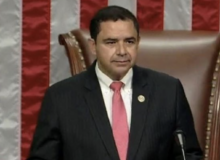By Julio Rivera
One culturally significant matter that flew under the radar late in 2023 was the story of a school board in Colorado voting to approve a resolution encouraging its schools to display the national motto of “In God We Trust” in classrooms, along with other “historical displays depicting the founding and heritage of America.”
In a time where Christianity, as well our original national values seem to be under constant attack from both anti-Christian and anti-American radicals, the vote, which took place only days before schools would close for Christmas, displays a positive example that hopefully other school districts nationally will follow this year.
“In God We Trust” — These four words, emblazoned on our currency and enshrined as the national motto of the United States, serve as a reminder of the foundational role that Christianity has played in shaping our nation. Yet, despite this motto, it seems that as a society, we often fail to uphold the values it represents.
In a world rife with greed, violence, drugs, sex, and so many other spiritual trappings, the moral fabric of our society has unraveled. However, amidst this decline, there remains a beacon of hope — the timeless wisdom and moral guidance found through a personal relationship with Jesus Christ.
Christianity, with its emphasis on love, compassion, and moral integrity, provides a blueprint for the formation of a healthy, law-abiding society of free-thinkers with free will. The principles espoused in the Bible — from the Ten Commandments to the teachings of Jesus Christ — have served as the moral foundation for Western civilization for centuries.
Remarkably, many of these biblical ideas are echoed in the Constitution and the Bill of Rights, illustrating the profound influence of Judeo-Christian values on the formation of our nation.
Take, for example, the concept of individual rights and freedoms enshrined in the First Amendment. The freedom of speech, religion and assembly guaranteed by this cornerstone of American democracy reflects the biblical idea of human dignity and the inherent worth of every individual.
Similarly, the Eighth Amendment’s prohibition against cruel and unusual punishment resonates with the biblical injunction to treat others with fairness, compassion, and respect.
Yet, despite the alignment between Christian values and the principles enshrined in our founding documents, we find ourselves grappling with a society that seems increasingly detached from its moral moorings. The proliferation of violence, substance abuse and gender confusion, serves as a stark reminder of the consequences of straying from the path of righteousness.
In a culture that glorifies instant gratification and materialism, many have turned away from the spiritual nourishment offered in the Bible. Instead of seeking solace and guidance in the book’s teachings, they seek fulfillment in fleeting pleasures that leave them empty and unfulfilled. The result is a generation adrift, lacking the moral compass necessary to navigate life’s challenges with integrity and purpose.
Moreover, the erosion of traditional family values has further contributed to the moral decline of society. As the institution of the family comes under attack from various quarters, children are deprived of the stable and nurturing environment essential for their moral and spiritual development.
Without strong familial bonds to provide guidance and support, many young people are left vulnerable to the pernicious influences of a culture that glorifies hedonism and self-indulgence.
In light of these challenges, it is incumbent upon us as a society to reaffirm our commitment to the values that have sustained us throughout history. We must heed the wisdom of the past and recognize the enduring relevance of Christian values in fostering a society characterized by justice, compassion and respect for human dignity.
Moreover, we must recognize that true freedom does not entail the absence of restraint, but rather the cultivation of virtue and moral character. As the Apostle Paul wrote, “For you were called to freedom, brothers. Only do not use your freedom as an opportunity for the flesh, but through love serve one another” (Galatians 5:13).
In other words, freedom must be tempered by responsibility — responsibility to God first, as we also consider our fellow man, and finally, ourselves.
As we strive to build a better society, let us not forget the words inscribed on our currency – “In God We Trust.” These words serve as a timeless reminder of the transcendent values that have guided us through times of trial and tribulation. Let us embrace these values wholeheartedly and seek to live lives that reflect the love, compassion,and moral integrity exemplified by the teachings of Jesus Christ.
“In God We Trust” is more than just a slogan — it is a testament to the enduring influence of Christian values on our nation’s identity and heritage. By embracing these values and seeking to live lives of virtue and righteousness, we can work toward the creation of a society that honors God and upholds the dignity and worth of every individual.
Only then can we truly fulfill the promise of our national motto and build a brighter future for generations to come.
Julio Rivera is a business and political strategist, cybersecurity researcher, and a political commentator and columnist. His writing, which is focused on cybersecurity and politics, is regularly published by many of the most respected news organizations in the world. Read Julio Rivera’s Reports — More Here.






